The Adaptability of a Plan: Embracing Uncertainty with Ease
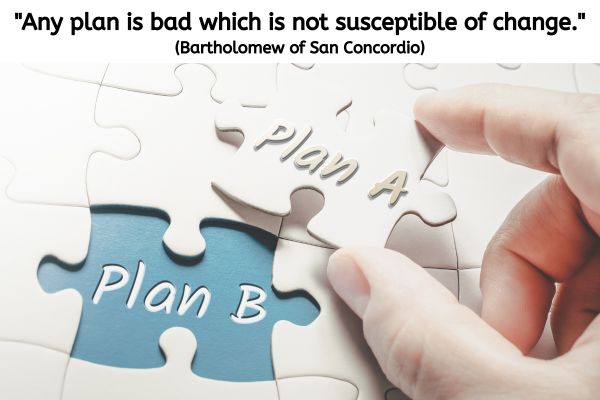
Happy Monday! Today’s quote is:
“Any plan is bad which is not susceptible of change.” (Bartholomew of San Concordio)
I’ve got a course coming up in a few months where the organisers offer the option of attending virtually or in person. For this particular event, the current plan is that I attend in person. However, I’m also aware that there is a possibility that the plans I’ve put in place for that may change given some other logistical aspects in other areas of my life. I did check before booking that if necessary I could swap to the virtual option if circumstances changed, so the providers are also aware it’s a possibility.
I was talking to a friend recently saying how much I was looking forward to the trip, and they basically asked, “Don’t you find it stressful not knowing if you’re going or not?” It’d never occurred to me that was a situation that couldn’t be flexible. My priority is the learning and know this provider is great at providing a fantastic experience to those also attending virtually, so if I can’t go in person, I will be there that way. If an unexpected situation arises preventing me from being at my computer, I’ll simply plan to catch up on the recording later. Whilst that wouldn’t be my preferred option, but it’d still be a workable solution.
It doesn’t seem a big deal to me that for this plan, there’s a plan A, plan B, and so on. I trust that whatever other twists and turns of life has happened between now, and then I’ll just adapt the plan accordingly, or just create a new one all together.
In the world of coaching, there is often an emphasis on the importance of setting goals, making plans, and working diligently towards achieving them. However, as Bartholomew of San Concordio astutely observed, “Any plan is bad which is not susceptible of change.” Getting attached to one route to a specific destination can then create unnecessary pressure if circumstances would suggest a diversion or alternative route to get to that same finish spot.
Life itself is dynamic, constantly presenting us with new opportunities, challenges, and circumstances. Therefore, any plan that rigidly adheres to a fixed outcome or path is inherently flawed, as it fails to acknowledge the inherent fluidity of both our inner world and the world around us.
One of the aspects of how I coach now is about encouraging clients to approach planning with a spirit of openness and adaptability. Rather than viewing plans as rigid blueprints for the future, see them as dynamic frameworks that can evolve and unfold in response to changing circumstances. This shift in perspective frees our clients from the constraints of perfectionism and fear of failure, empowering them to embrace change as a natural and inevitable aspect of life.
Our thoughts shape our perceptions, emotions, and actions, ultimately influencing our experience and even our outcomes. From this vantage point, we recognize that the quality of our plans is not determined by their adherence to a fixed structure, but rather by the clarity and wisdom of the thinking behind them.
In practice, this means that rather than striving to create the perfect plan, our focus as coaches is on helping our clients cultivate a deeper understanding of their own innate wisdom and resilience. We guide them in accessing their inner guidance and intuition, trusting that they have the capacity to navigate life’s twists and turns with grace and confidence.
Moreover, we encourage our clients to adopt a mindset of curiosity and experimentation when it comes to planning. Instead of viewing setbacks or deviations from the original plan as failures, we see them as valuable learning opportunities. Each unexpected turn presents an opportunity for growth, adaptation, and course correction.
So I shouldn’t have been surprised that a training provider who also has this same understanding of life should be unconcerned at potentially having numbers change at the last minute. Adaptability to me currently looks like the ability to respond to what’s in front of you – which is so much easier if you haven’t got a lot of thinking around how that should be.
Maybe you’ve had the experience of driving and realising that there is a diversion ahead. Perhaps sometimes you will find you are caught up in thinking around how this will add time onto your journey, how everything else will need to adjust, how this is so typical etc etc. You’ll probably notice, that because we are living in the feeling of our thinking, that you then start to feel pressure, tension, and anxiety with all that revved up thinking.
Then there are other occasions when you may hit the same diversion, but you are in such a good mood that you don’t give the time of day to any thoughts around how much time this will add to your journey – maybe the sun is shinning, and you’re enjoying listening to new music by your favourite artist etc, etc. Without all that thinking piled on top of each other, there’s not the tension, and you can happily go along this new diversion.
The diversion is still the same -it’s the thinking that we have around all that which is the difference.
Ultimately, the true measure of a successful plan lies not in its ability to adhere rigidly to a predetermined outcome, but in its capacity to facilitate growth, learning, and evolution. As coaches, our role is to support our clients in cultivating this mindset, helping them to embrace change as a natural and necessary part of their journey towards fulfilment and success.
In conclusion, Bartholomew of San Concordio’s words remind us that in a world characterized by constant change, any plan that resists adaptation is inherently flawed. As Three Principles coaches, we invite our clients to embrace change with open arms, trusting in their own innate wisdom and resilience to navigate life’s ever-shifting landscape with grace and courage.
About Jen Waller

Jen Waller is on a mission to support, nurture and encourage coaching skills and talents from non-coach to coach and beyond.
As an experienced coach and trainer, Jen is happy to utilise all skills at her disposal to assist clients from getting out of their own way and making a difference in the world with their coaching. Find out more about the support Jen offers here.
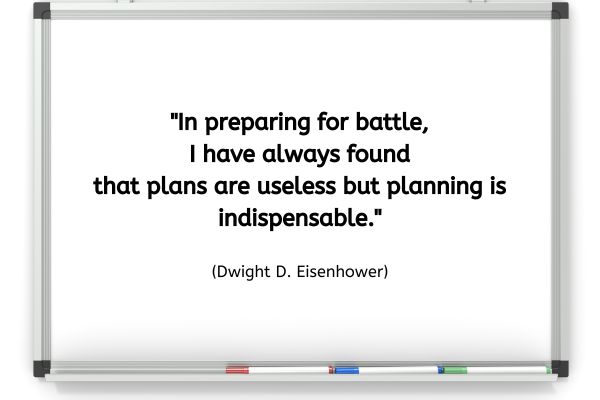

 Go ahead, grab a paper and pen and jot down the most important characteristics that you would be looking for in this person.
Go ahead, grab a paper and pen and jot down the most important characteristics that you would be looking for in this person.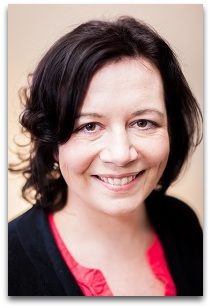 Alison Beierlein has international training and experience and over a decade of experience in business management. She coaches female entrepreneurs in the areas of leadership, empowerment, confidence, business growth, and self-development. Her goal is to empower women to uncover their larger purpose and design clear strategies to help them achieve their full potential.
Alison Beierlein has international training and experience and over a decade of experience in business management. She coaches female entrepreneurs in the areas of leadership, empowerment, confidence, business growth, and self-development. Her goal is to empower women to uncover their larger purpose and design clear strategies to help them achieve their full potential.

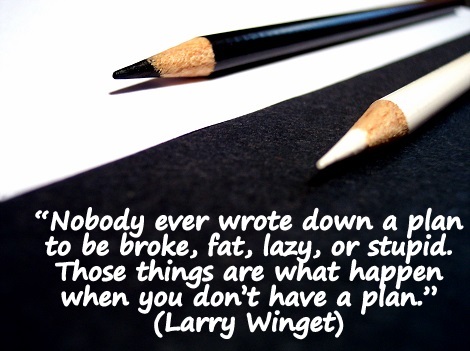


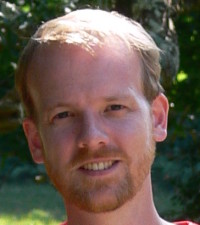 My name is Angus MacLennan and I am a Coach delivering practical Business Support to Business Owners – specialising in small to medium size businesses.
My name is Angus MacLennan and I am a Coach delivering practical Business Support to Business Owners – specialising in small to medium size businesses.